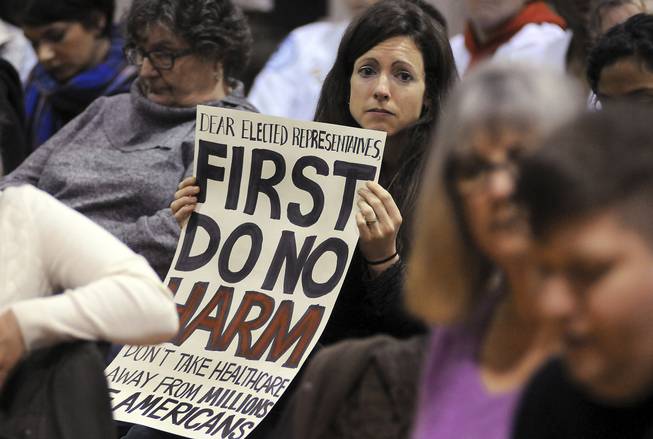
Butch Comegys/The Times & Tribune / AP
Amy Kuiken, 34, of Dallas, Pa., holds her sign, as she listens to a person’s story during a town hall meeting regarding health care at the United Neighborhood Center in Scranton, Pa., Tuesday, Feb. 21, 2017. Sen. Pat Toomey, R-Pa., was invited to speak at the town hall, but did not attend.
Wednesday, Feb. 22, 2017 | 4:14 p.m.
DENVER — Republicans who benefited from rowdy town halls six years ago and harnessed a wave of discontent with Democrats to win seats in Congress are learning a hard lesson this week as they return home: The left is happy to return the favor.
Across the U.S., Democrats and their allies are spending this short congressional recess protesting elected Republican politicians who are avoiding the events that often turn into shouting matches.
Just like the tea party sympathizers who vented against Democrats and President Barack Obama, the new left and left-leaning protesters are taking out their ire on Republicans and their links to President Donald Trump.
In Denver this week, the activists targeted Republican Sen. Cory Gardner — denouncing him as inaccessible and beaming a picture of him fashioned into a "Missing" poster to a wall of the Denver Art Museum while protesting Trump's plans to boost energy production on public lands.
Gardner "is supposed to represent us, but where is he?" said Emma Spett, a 22-year-old environmental activist from Denver who says she's "terrified" of environmental policy changes backed by Trump.
Gardner defeated a Democrat in 2010, and used impromptu town hall meetings heavily attended by tea party members in his campaign to rail against Obama's Affordable Care Act and incumbent congressional representatives he labeled as out of touch with voters.
Now an incumbent who doesn't face re-election until 2020, Gardner has no town halls scheduled and was met Wednesday at an agricultural forum in Denver by protesters yelling "We want a town hall!"
He dodged questions from reporters about why he did not plan any, saying that he supports "people who are expressing differing points of views" and that his staff meets with protesters.
Experts say that avoiding town halls is a tactic used by incumbents to dodge being berated in widely publicized local events.
"If you're there at a town hall meeting and there's hundreds of people there yelling at you, it's going to be a media event," said Seth Masket, a political scientist at the University of Denver "They're calculating that the bad press they're going to get from not having a town hall is not going to be as bad as that."
In Montana, Republican Sen. Steve Daines got waylaid with boos and jeers from hundreds of protesters just for rescheduling an appearance before state lawmakers Helena from Tuesday to Wednesday.
"What a coward!" said Katherine Haque-Hausrath, a protest organizer who demanded he meet with constituents. "If he doesn't listen to us now, he can listen to us in 2020 in the election."
Daines was met inside the Capitol Wednesday by dozens of protesters who yelled "Do your job!" Asked why he rescheduled, Daines said he decided to hold multiple events Wednesday and nothing on Tuesday.
He also reminded reporters about the result of last November's election: "While every voice must be heard in Montana, the reality is the people of Montana rejected Hillary Clinton and voted for Donald Trump."
About 200 protesters clamored Wednesday outside a Carson City, Nevada, casino where Sen. Dean Heller and Rep. Mark Amodei, both Republicans, spoke behind closed doors in a session for business leaders — and ended getting booed and heckled inside the private luncheon.
Amodei defended himself, saying he was there doing his job and meeting with constituents. And Heller said he would hold a town hall meeting if rules were put in place similar to those for debates in Congress.
"No applauding, no booing and we will have a one-on-one dialogue," he proposed.
In Nebraska, Republican Rep. Don Bacon said in an interview that he plans no town meetings for now because he sees no point in them turning into forums for people who want to disrupt the events.
"What about the average person, whether or not they agree with me, that's in the audience? They want to have a dialogue," he said. "What I'm seeing, and I'm seeing it all over the country, is people grab the microphone, and don't give it back."
And Texas Rep. Louie Gohmert announced he opted for telephone town halls because groups from what he called "violent strains of the leftist ideology...are preying on public town halls to wreak havoc and threaten public safety."
Republicans accused of going into hiding are getting some sympathy — from Democrats they defeated, including former Colorado Rep. Betsy Markey.
Back in 2010, she held town hall meetings focusing on health care only to be greeted by a deluge of conservative protesters who showed up waving yellow "Don't Tread on Me" flags.
"They were pretty rowdy," Markey recalled with a chuckle.
Republicans who managed their campaigns to take advantage of the tea party movement's populist appeal must learn to take what was dished out before to the Democrats, she said.
"That's why you were elected, to represent the people. You come back on weekends, you come back on breaks, and you talk to people — even if they don't like what you're doing," Markey said.
Associated Press writers Matt Volz in Helena, Montana and Thomas Beaumont in Lincoln, Nebraska contributed to this report.
